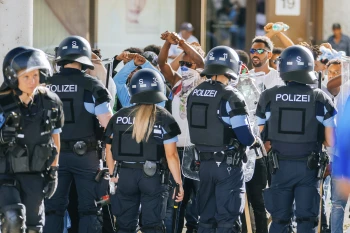In a significant development reflecting the intricate dynamics of international relations, German authorities recently carried out a series of raids targeting a group believed to be conspiring to overthrow the Eritrean government. This unprecedented action has raised eyebrows both within Germany and internationally, shedding light on the complexities surrounding political dissidence, national security, and the ramifications for relations between Germany and Eritrea.
Background on the Eritrean Political Landscape
Eritrea, a small East African nation, has long been under the firm grasp of President Isaias Afwerki, who has ruled since the country gained independence from Ethiopia in 1993. His regime is known for its oppressive tactics, including widespread human rights violations, repression of dissent, and a lack of free press. Over the years, numerous Eritrean dissident groups have emerged abroad, particularly in Europe and North America, advocating for regime change. However, the pursuit of these political goals often brings complications, especially in host countries where laws concerning political asylum and freedom of expression must be navigated.
Details of the Raids
On a day marked by coordinated efforts, German police, in collaboration with federal prosecutors, executed dawn raids across multiple locations, including residences and community centers associated with Eritrean expatriates. The operation reportedly involved 14 locations, primarily in the German states of North Rhine-Westphalia and Lower Saxony, where suspects were believed to be conducting preparatory activities for an armed uprising against the Eritrean government.
The authorities apprehended several individuals linked to the alleged plot and confiscated materials that suggested plans to fund and facilitate a coup. This included weapons, communications equipment, and documents outlining operational strategies. German officials emphasized that they acted on intelligence assessments indicating a substantial threat to both Eritrea’s sovereignty and Germany’s own security.
Underlying Motivations and Concerns
Though the group’s aspirations to overthrow a regime comprised of serious human rights abuses may resonate with many, the German government’s actions highlight a critical balancing act. Germany is known for its commitment to human rights and the rule of law, leading to a cautious approach toward acts that may be perceived as endorsing violence or insurrection.
The raids were met with mixed reactions. Some Eritrean activists expressed support for the operation, viewing it as necessary to prevent violent confrontations that could arise from radical dissent. Conversely, others criticized the action, arguing that it stifles legitimate political discourse and the rights of exiled Eritreans to organize against repression. The German government emphasized that while it recognizes the plight of Eritrean refugees and dissidents, any actions taken must remain within a framework that respects legality and due process.
Broader Implications for German-Eritrean Relations
The incident marks a potentially pivotal moment in the relationship between Germany and Eritrea. Germany has historically maintained a somewhat neutral stance towards Asmara, often offering humanitarian aid while remaining critical of the government’s human rights record. These recent events could complicate diplomatic relations, especially if Eritrea interprets the raids as an infringement on its sovereignty or as meddling in its internal affairs.
The Federal Republic of Germany may need to navigate the fine line of upholding its values while engaging with a government notorious for its repressive tactics. Moreover, the raids underscore the challenges faced by Western nations in addressing the aspirations of diasporic communities without infringing on their rights or igniting violent conflicts.
Conclusion
Germany’s recent raids on a group allegedly plotting to overthrow the Eritrean government highlight significant issues surrounding political dissidence, national security, and international relations. As global dynamics shift and new diasporic movements emerge, the actions by German authorities serve as a reminder of the complex intertwining of domestic law enforcement and foreign policy. While the quest for justice and democratic governance resonates universally, the paths taken to achieve those ends must remain within the bounds of legality, respect for human rights, and the pursuit of peaceful avenues for change. The coming months will reveal how Germany balances these pressing concerns and what they mean for Eritrean expatriates seeking justice and reform in their homeland.
Email Us on editorial@nnafrica.com













